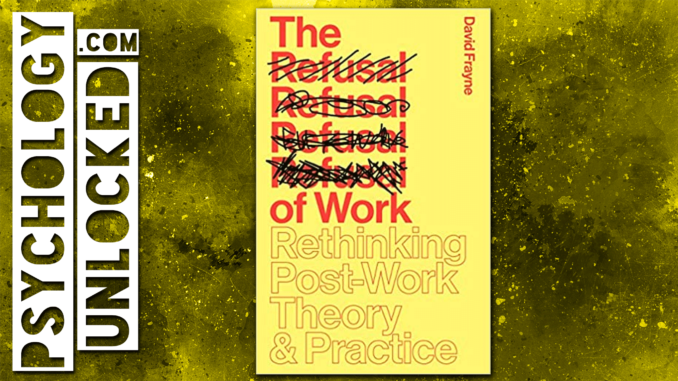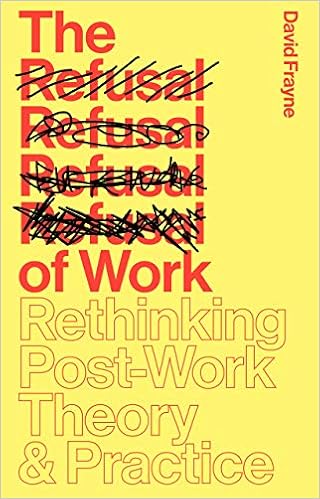
At £16.99 – and the most expensive book I’ve read this year – David Frayne’s Refusal of Work presents an enevitably ironic manifesto for freeing oneself from the grips of salaried work.
To note the irony is not to dismiss Frayne’s arguments, which are consistent and convincing, but to question Frayne’s convictions.
Frayne himself does not refuse work. He is “a lecturer and social researcher based at Cardiff University”. This is something we learn before even reading the introduction, in which Frayne rejects the “what do you do?” question, which he says uses employment as a label.
- The Dunning-Kruger Effect: Why we think we know more than we do
- The Yale Food Addiction Scale: Are you addicted to food?
- Addicted to Pepsi Max? Understand addiction in six minutes (video)
Psychology Against “Work” Reading List

The Work Cure
by David Frayne
Edited by David Frayne, this is a series of essays, which offer “a powerful critique of contemporary discourse that portrays work paid employment as a moral imperative, essential for our health and well-being.”

Resisting Work
by Peter Fleming
Another book looking at modern-day work from a societal level. When did a job shift from something we do, to something we are?

Bullsh*t Jobs
by David Graeber
If you want to get fired up a little, then this is a less-academic angle on the same topic.
One might assume that Frayne would tell us about his love of bird-watching, or some other hobby. But his About The Author goes on to outline his main work interests and promotes his Twitter account – a work-related Twitter account.
Frayne, I think it is fair to say, is not practising what he preaches in this book. He is sharing his observations of others.
Frayne’s life seems locked within the confines of his labour, and at £16.99 it can be assumed that the same is probably true of his readers. The enduring irony of this eight-chapter essay is highlighted effortlessly in the title of the final chapter: From Escapism to Autonomy.
Just as Frayne shows no inclination to remove himself from his career-driven world as an academic sociologist, his readers are more likely to reap from his book cherished moments of escapism than the autonomy that is being discussed.
I think it’s clear that I question Frayne’s authenticity in producing this extended manifesto. However, what he writes is captivating.
At the beginning of the book, Frayne sets out a provocation, asking the question: “might it be possible, in the future, for everybdy to work less and have more time for their own, autonomous self-development?”
Drawing on Marxist thinking, critical theorists, and the more contemporary work of Gorz (referenced on almost every other page) and Weeks, Frayne takes three chapters to discuss the theoretical framework of capitalist labour, the “work ethic” and the all-encompassing control it has on our lives – including such times as are considered “free” time.
In a particularly memorable example, Frayne highlights Weber’s rejection of “hobbies”, stating instead that he takes such activities extremely seriously and will not have them belittled or trivialised by a consumerist, capitalist society.
Chapters five to seven concern Frayne’s own interview-based research about individuals and couples who are resisting work for a variety of reasons: ideology, medical, disillusion, family.
These chapters neatly tie Frayne’s case studies with previous research and theory: re-enter Gorz… and rather than chronologically follow each case study, quotes are used to add flesh to arguments about breaking free from the world of work, the pleasures gained by resistance to work, and – ultimately – the pains, tentions and worries associated with removing oneself from work.
Frayne’s conclusion openly states the limitations of resisting work on an individual level and calls on a greater interest in “the work dogma” at a societal level.
In his closing pages, Frayne outlines four key points that read as a Marxist-inspired manifesto, ultimately calling for a “future where a sense of social solidarity and purpose are achieved through anything other than commodity relations”.
It just remains a tad ironic that Frayne had to publish this book – in addition to articles and chapters elsewhere – in order to satisfy the University of Cardiff’s powers-that-be, and ensure he has a job to return to.

